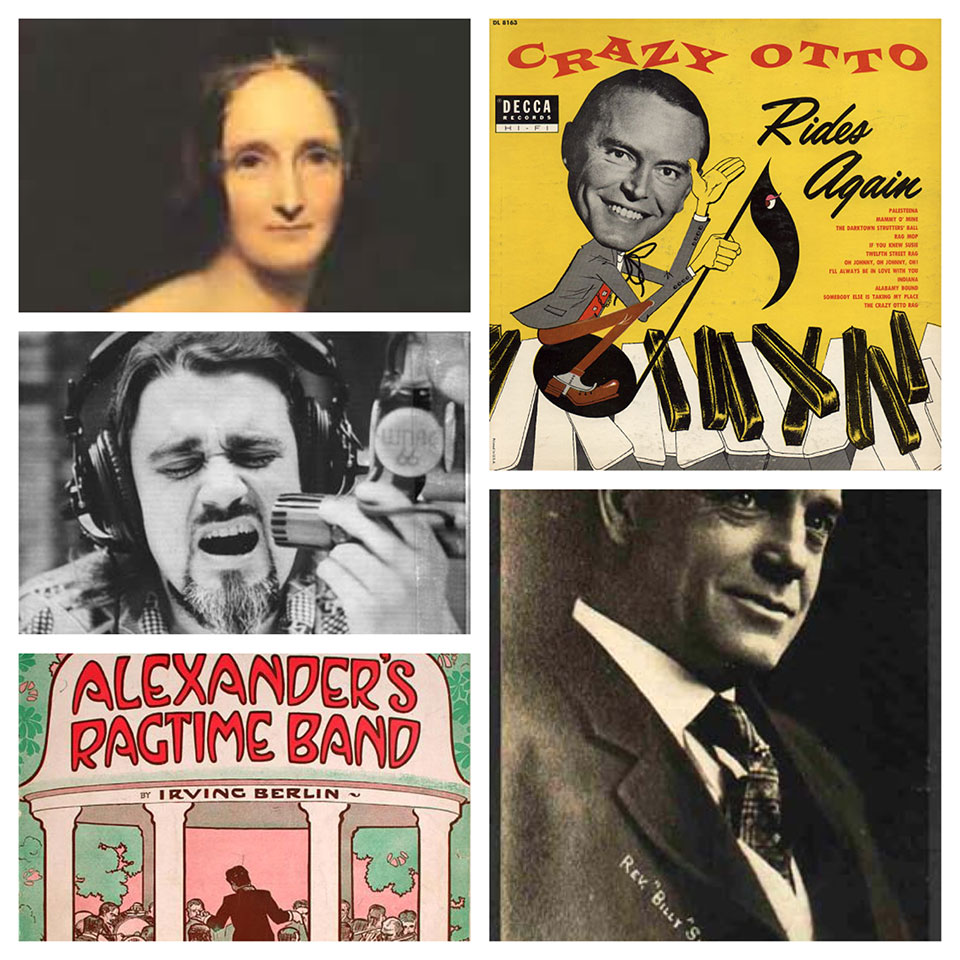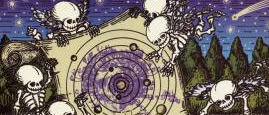By David Dodd
First, just a little background: “Ramble On Rose” was introduced on Tuesday, October 19, 1971 at the Northrop Auditorium at the University of Minnesota in Minneapolis. The show is noteworthy for a number of reasons. First performances at the show, besides "Ramble on Rose," included "Comes a Time," "Mexicali Blues," "One More Saturday Night" (on a Tuesday!), and "Tennessee Jed." It was also Keith Godchaux's first show. "Ramble On Rose" occupied the #2 spot in the second set, following "Truckin'," and preceding "Me and Bobby McGee."
Numbering the song among his favorites, Robert Hunter stated in an interview in Relix that "'Ramble on Rose' is a particular favorite -- there's something funny about that song."
In David Gans's Conversations with the Dead, Hunter says: "I think ‘Ramble On Rose’ is the closest to complete whimsy I've come up with. I just sat down and wrote numerous verses that tied around ‘Did you say...’ “
“Ramble On Rose” also happens to be the song that set me off on my little adventure of annotating the Grateful Dead’s lyrics. When I first started the project, I was working as a reference library assistant at the Fremont Main library in Alameda County. I was living in Oakland, commuting via BART the 30 miles each way every day to Fremont, and going to as many Dead concerts as I could. Those were some good days — I was learning about what I wanted to do with my life (become a librarian) and at the same time, seeing the Dead or Jerry with his various bands on a regular basis. The Greek, Frost, Henry Kaiser, SF Civic, Oakland Coliseum Arena, Keystone Berkeley,Cal Expo….
Where was I? Oh yeah. “Ramble On Rose.” Something about that song… I still find new stuff in there all the time. One of my biggest revelations about the song was actually from a mis-hearing. It was at the closing of Winterland show, when I clearly heard Garcia sing, “Buckle up, and buckle down, do yourself a favor.” Not the real words (and not what Jerry sang), but definitely of some import to me at the time. Hmmmm. That would be a fun component in any and all of these blog posts and subsequent conversations — what did you hear, as opposed to what the words really were? American writer Sylvia Wright coined the term “mondegreens” to refer to these creative mis-hearings. Feel free to chime in at any time with your own! (“Wake up to find out that you are disguised as a squirrel...”)
So. “Ramble On Rose.” And I am rambling. It’s a predilection of mine, to go off on tangents, and I’ve found it serves me well. I like to make strange connections. I started making the connections in this song simply by trying to figure out who all and what all was being talked about by Robert Hunter. That guy! You could be standing there, innocently listening to a rock and roll song, and BAM — he hits you right between the eyes.
I think my first foray into this kind of fact-finding was when I decided to look up the names in the song, starting with Billy Sunday. I’m not going into the whole annotation thing here (just search online for “annotated Ramble On Rose,” except to say that I was pretty surprised by the cast of characters and who they turned out to be. I mean, a tent preacher who got his start as a professional baseball player? A ragtime piano player from the 1950s named Crazy Otto? The legendary DJ Wolfman Jack? This song, if you put images with all of it, would look something like the cover of Sgt. Pepper’s Lonely Hearts Club Band. A highlight of my work on the song was receiving a phone call from Johnny Maddox (aka Crazy Otto), who was still playing ragtime for a living, at a place in Durango, Colorado. We had a great conversation.
The same is true for all of the musical references in the song. I did a medley once with David Gans for his radio show featuring snippets of all the various songs and types of music in “Ramble On Rose.” Amazing! Ragtime (100 verses thereof), Irving Berlin (“leader of a band,” from ‘Alexander’s Ragtime Band’), the blues (“Mojo Hand”), nursery rhymes (Jack and Jill), gospel (Jericho), country (“I Walk the Line”), jazz standards (“Ramblin’ Rose”), folk (“Green Green, the Grass is Green”), and more. Here’s a link to streaming audio for that musical collage, plus some verbal commentary… with thanks to David Gans:

Top left going clockwise are Mary Shelley, a “Crazy Otto” album cover, Billy Sunday, sheet music cover for “Alexander’s Ragtime Band” by Irving Berlin, Wolfman Jack.
So, here’s my question, now that I have run to ground all of the song’s references—historical, literary, musical, etc. And that is: can anyone get a handle on this song from a “meaning” point of view? I do love hearing personal interpretations, and Hunter has made it clear over the course of a number of interviews that he will not comment on a song’s “meaning” because that would shut down the ability of each of us listeners to construct our own meaning. It would be fun, and enlightening, to hear just what you take away from this particular song.
Is the narrator singing to someone who calls herself “Ramblin’ Rose”? Is the line about singing “a hundred verses of ragtime” a threat or a promise? Who is the leader of the band mentioned in the song? Or is that a metaphor? What is meant by the series of “just like” comparisons?
Or do you prefer to let the lyrics wash over you, invoking a mental kaleidoscope of images and music? I like to think that the curious structure of the music Garcia wrote for these words is an answer, or a complement to Hunter’s hodge-podge—it’s an unclassifiable amalgam of ragtime, shuffle, slow rock and roll, and who knows what all else—opinions?
My online annotation of the song includes an actual analysis of the lyric’s prosody—its rhyming and metric components, as follows. Useful? Perhaps not, but kind of fun:
The song lyric is structured in trochaic rhythm, with paired verses consisting of two lines of triameter, one of quadrameter, and another of triameter, for a total of 13 strong feet (!) per verse. The verses' rhyming pattern is A, B, C, [C], B; with the bracketed [C] being an optional internal rhyme: halls, walls; chains/change; and plush/flush. There are seven verses, with the first six in pairs. The final verse stands alone, carrying into the final chorus.
The chorus' rhythm stays in trochees for the first line of five beats, then switches to dactylic quadrameter for the second line, and a punchy single dactylic line of two beats to wind up. The chorus contains no rhymes. It is repeated three times.
The bridge is less easy to pin down, moving from iambic to trochaic to dactylic rhythms. It similarly dispenses with any firm rhyming pattern, relying solely on the assonances contained in "ragtime" and "county line." The bridge is repeated twice.
This is one of those Grateful Dead songs that generates a lot more questions than answers. And I look forward to hearing everyone’s thoughts! Chime right in.
dead comment
A skull to go with the roses.
Rambel on Rose
RIAMBLE ON ROSE & MIGHT AS WELL?!
PORTAL ENTRY #4 from the FB page:
' MY G.D. FRIENDS PORTAL '
"well there seems to be a beat now"
This is more of a sing-along musical journey than a particularly lyrical one, though there IS an interesting word interplay in the bridge..... So simply start singing one right alongside the other, & voila-~~(you may wanna get the boombox to play RAMBLE ON ROSE"!)
sing:
"Just like Jack the Ripper
Just like Mojo Hand
Just like Billy Sunday
In a shotgun ragtime band
Just like New York City,
Just like Jericho
Pace the halls and climb the walls
Get out when they blow
along with:
"Great North Special, were you on. board?
You can't find a ride like that no more
Night the chariot swung down low
NINETY NINE children had a chance to go"
ditto for the 2nd verse & sing both songs together~
-------------------------------
then sing the verses together &
the composite chorus goes like this:
"Might As Well, Might As Well" "Did you say your name was "Might As Well, Might As Well" "Ramble On Rose?" "Might As Well, Might As Well" "Ramble On Baby"
"Might As Well, Might As Well, MIGHT As Well," "SETTLE down easy,,,,"
"MIGHT AS WELL, (Ramble On Rose!") MIGHT AS WELL" .....!
-----------------------------
Jerry's leads easily stand in for one another in front of the oddly familiar & uncannily similar musical backdrops~
------------------------------
With "NEVER" being the common word used in each bridge, & the crossover word for beginning the other chorus, here's how the composite bridge sings:
"I'm gonna sing you a hundred verses in ragtime,
"I know this song it ain't NEVER ever gonna end" "NEVER had such a good time in my life before"
"I'm gonna march you up and down the local county line"
"I'd like to have it one time more"
"TAKE YOU TO THE LEADER OF THE BAND!"
"One good ride from start to end
I'd like to TAKE RIDE AGAIN,,
AGAIN!"
and if you manage to keep the timing going & sounding like "Never, Never", the fuller adventure is revealed. I know, it's kinda out there, but it's there!!
So folks, ya might as well ramble on, rose!
🕉
kenny
After much consideration....
Okay I'll try to keep this "short".
It's about 1 person. A rose has a sweet center, surrounded by a thorny exterior. Consider the typical Hunter duality here. We have good intentions, we are good people, but our actions say otherwise. We put up those "walls" that make it hard to get to us, to find us. To find ourselves. There's potentially an internal struggle angle here of introspection and fighting what you see and not wanting to accept it.
Jack the Ripper GOT AWAY with the crime, let's not forget. This is the FIRST reference. I think that is important. This is not about a man on death row who got caught, but rather a man who got away and is on the run and has that weight on his shoulders of what would happen if the law came got em.
Frankenstein wasn't the monster, they were the creator. Mary Shelly being the creator of the creator of the monster. We are not the monster, but rather we create our own monsters. We are good people, we have good intentions, but alas, we end up in situations where we kind of become the monster...
Walk you up and down the county line... jailor, card games, pace the halls, climb the walls, clank your chains, etc. Lots of prison references for sure.
Let's say this song is about a rolling stone who committed a crime and got away with it, but as a result is now haunted by having to resort to living life on the run. The imagery of prison are the outcome if they were caught or turned themselves in. I know this song, it aint never gonna end. Endless life on the run, this is it. This is how I have to live now forever until I die. Why is it that Mama and Papa are the ones talking to the Jailer? Moms and Pops know son did it and want him to turn himself in? Do yourself a favor... accept fate.
The leader of the band could be the warden or someone like that? Or if we go with the deathrow stackolee theory, the one instituting the death penalty. Could double as the 'meet your maker' kind of leader of the band.
Also, if we're making a Johnny Cash reference for walk the line, let's connect Jericho there too. Jericho Hill = Cocaine Blues. trouble ahead.....
Go deeper -- Jack and Jill, Jack was the one who broke his crown and Jill came after him. When they got home, Jack got patched up but JILL got whipped by mother too for 'causing' Jack's disaster. So that plays into the theory that this is also about someone taking the fall for a crime they didn't really commit. The accomplice. Way to go Eve....
Go even deeper -- the Jacks references. Aces. Royal Flush. Just saying you play the cards you are dealt.
All that said, I still think there is the other angle about morality in general here. Grass aint greener either side of the hill. Still the guy coming to terms like whether I'm alive or dead it aint no difference, be here now, it's my soul, there is no place I'm going that's a step up, this is it. Make the most of THIS. Your only shot at something remotely blissful is what you make of what you got in front of you.
Settle down easy though, always makes me think of coming to terms with death. Death penalty? Or just accepting who you are and what your life is IS in fact just that and nothing more. Make it.
That solo says more without words than I describe... Thank you Jerry. Been almost a year since the last comment. Just keeping the thread and spirit alive here. I could serious go on and on with theories here and ramble ... on ... rose... but I'll settle down easy for the night.. ☮️
Another "thank you"
I too wanted to say thanks for your post, and wanted you to know if was appreciated. :^)
what's it all about
I think the song is definitely about people & society in general and their funny habits that seem to stay the same over a great span of years, as well as being a cool way of commenting on the temperature (weather) and the price of gasoline.
A little insight, maybe
Just like Crazy Otto…..
Just like Wolfman Jack
Sitting plush with a royal flush Aces back to back
What is the Grateful Dead like? The aces back to back is clearly a reference in my mind to “Workingman’s Dead” and “American Beauty” if that wasn’t the high watermark I don’t know what was. I think Garcia had deep philosophical questions about identity and being a “rock star” in general. There is the public persona and perception and the reality I think perhaps Crazy Otto and Wolfman Jack are allusions to that.





Just like Crazy Otto…..
Just like Wolfman Jack
Sitting plush with a royal flush Aces back to back
What is the Grateful Dead like? The aces back to back is clearly a reference in my mind to “Workingman’s Dead” and “American Beauty” if that wasn’t the high watermark I don’t know what was. I think Garcia had deep philosophical questions about identity and being a “rock star” in general. There is the public persona and perception and the reality I think perhaps Crazy Otto and Wolfman Jack are allusions to that.
A secret you can’t tie down.
I think the song is definitely about people & society in general and their funny habits that seem to stay the same over a great span of years, as well as being a cool way of commenting on the temperature (weather) and the price of gasoline.